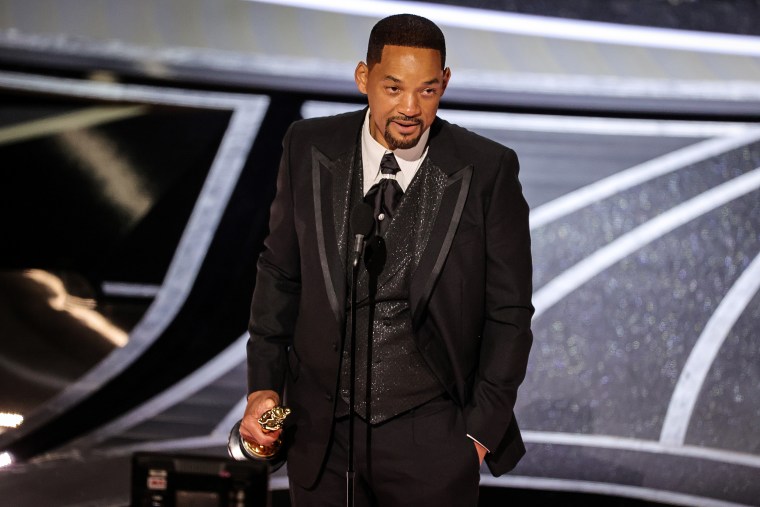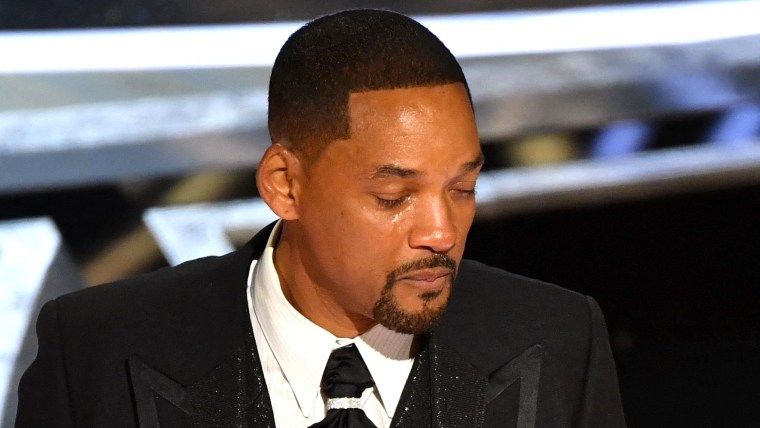In a stunning moment during the 94th Academy Awards on Sunday, “King Richard” star Will Smith hit Chris Rock after the stand-up comedian made a joke about the actor’s wife, Jada Pinkett Smith.
Smith, accepting the best actor Oscar in “King Richard,” later apologized to the film academy and his fellow nominees as tears streamed down his face. But he did not address Rock and attempted to justify what he did.
“Art imitates life. I look like the crazy father, just like they said about Richard Williams. But love will make you do crazy things,” Smith said as he was recognized for his role as Richard Williams, father of tennis greats Venus and Serena.
The encounter between Smith and Rock left the audience inside the Dolby Theatre stunned.
March 28, 202203:37
Rock, presenting the Oscar for best documentary feature, said that he was excited to watch Pinkett Smith in “G.I. Jane 2.”
In 2018, Pinkett Smith revealed she was diagnosed with alopecia, a condition that causes hair loss. Ridley Scott’s action film “G.I. Jane” (1997) starred Demi Moore as a woman who joins the Navy and shaves her head during her military service.
Smith then marched to the stage at the Dolby Theatre and hit Rock. The sound then cut out on the U.S. broadcast, but Smith appeared to be shouting the words: “Keep my wife’s name out of your f—–g mouth!”
In his acceptance speech, Smith appeared to compare the incident to Richard Williams’ fiery spirit.
 Will Smith accepts the best actor in a leading role award for “King Richard” at the Academy Awards in Los Angeles on Sunday.Neilson Barnard / Getty Images
Will Smith accepts the best actor in a leading role award for “King Richard” at the Academy Awards in Los Angeles on Sunday.Neilson Barnard / Getty Images
“Richard Williams was a fierce defender of his family,” Smith said in his speech, fighting back tears.
He said he got the chance to “protect” his co-stars in “King Richard.”
“I’m being called on in my life to love people and to protect people and to be a river to my people,” he said, tears streaming down his face.
He said that, in the entertainment industry, performers are forced to “take abuse” as “people talk crazy about you.”
“I want to be a vessel for love,” Smith said.
The extraordinary moment set off a frenzy of conversation on social media, where the moment was intensely dissected. In the wake of the incident, many tweeted that it was odd that the show’s producers forged ahead with the show.
Journalists in the room for coverage of the ceremony tweeted that, after the incident, Smith was approached by his publicist as well as fellow performers Denzel Washington and Tyler Perry.
After the show ended, the Los Angeles Police Department said that they were aware of the incident and Rock declined to file a police report.
“If the involved party desires a police report at a later date, LAPD will be available to complete an investigation report,” the department said in a statement.
In a tweet sent at 1:10 a.m. ET, the film academy said it “does not condone violence of any form.”
In this year’s best actor race, Smith faced off against Javier Bardem (“Being the Ricardos”), Benedict Cumberbatch (“The Power of the Dog”), Andrew Garfield (“Tick, Tick… Boom!”) and Washington (“The Tragedy of Macbeth”).
Smith earned largely positive reviews for his portrayal of Richard Williams, who pushed his gifted daughters to athletic greatness as a coach and a one-man public relations machine.
The actor’s victory Sunday night represents a career milestone for one of the defining and top-grossing Hollywood stars of the last 30 years.
Smith, who got his start as a hip-hop MC and star of the NBC sitcom “The Fresh Prince of Bel-Air,” rocketed to movie superstardom in the 1990s with hits such as “Bad Boys,” “Independence Day” and “Men in Black.”
In the years since, Smith has balanced blockbusters with roles in Oscar-courting dramas.
He was nominated for “Ali” in 2002, the year Washington became only the second Black man to win best actor, for “Training Day.” He was recognized five years later for “The Pursuit of Happyness” but lost to Forest Whitaker for “The Last King of Scotland.”
Dennis Romero contributed.

